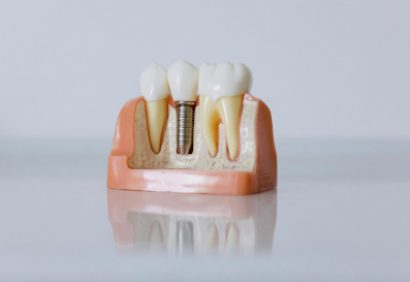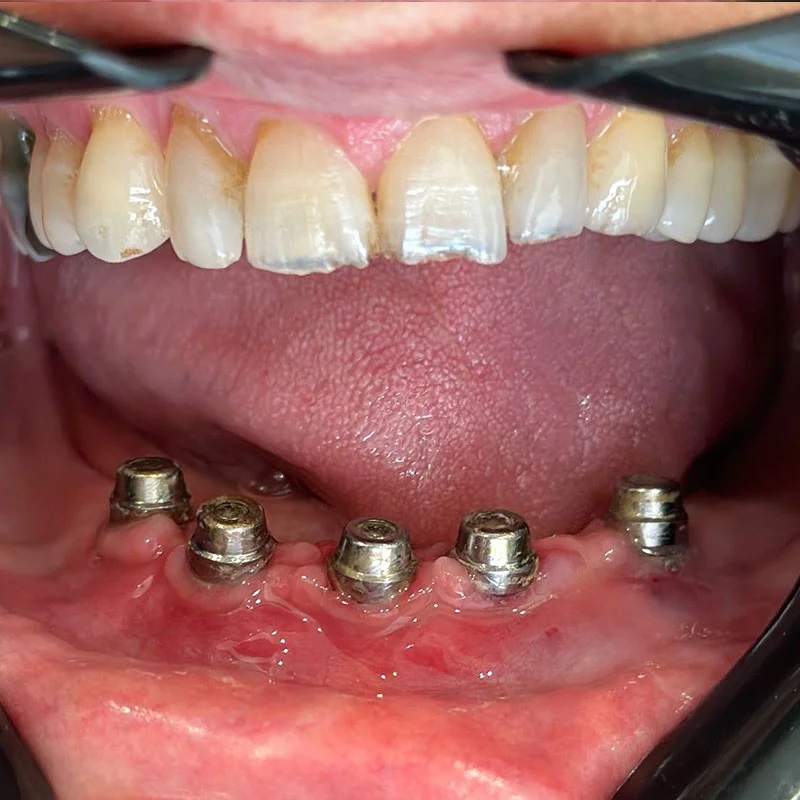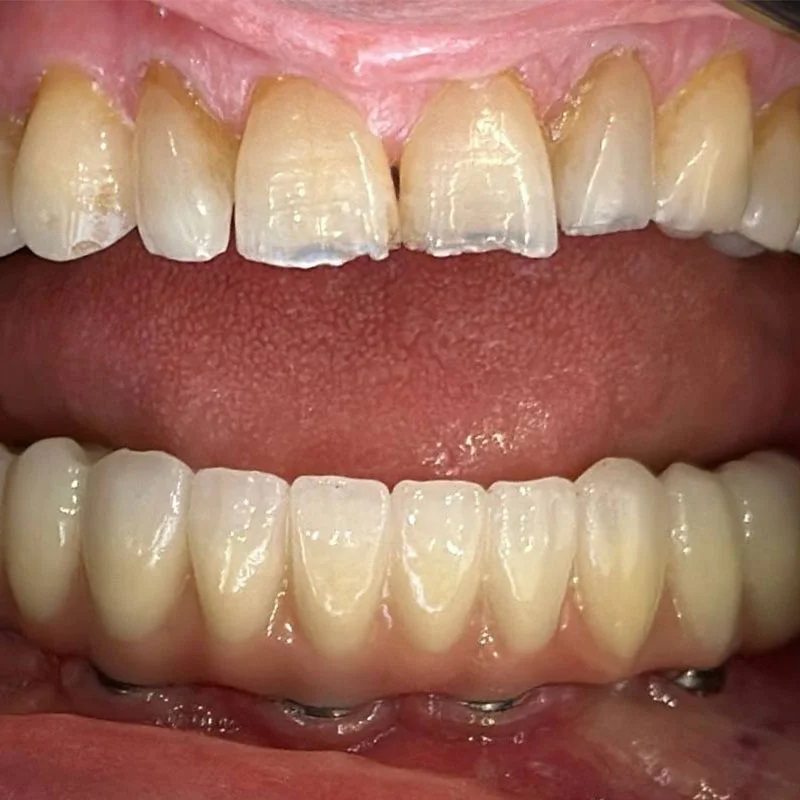Jump To:
Fast Facts
- Success Rate: About 95%
- Approximate Length of Stay: 4 Days
- Operation Duration: 1-2 Days
- Approximate Recovery: 2-3 Weeks

Dental Implant
A “Dental Implant” is a surgical procedure that involves placing a titanium post into the jawbone to serve as an artificial root for a replacement tooth. This post integrates with the bone over time and provides a strong foundation for a dental prosthesis, such as a crown, bridge, or denture.
Dental implants are a popular and effective solution for replacing missing teeth, offering a natural look and function similar to that of natural teeth.
Indications for Dental Implants
- Missing Teeth: Dental implants are used to replace one or more missing teeth.
- Tooth Loss Due to Decay or Injury: When a tooth is lost due to severe decay, trauma, or periodontal disease, an implant can be a long-lasting replacement.
- Support for Dentures: Implants can be used to secure full or partial dentures, improving stability and comfort.
- Avoiding Damage to Adjacent Teeth: Unlike traditional bridges, implants do not require the reduction of adjacent healthy teeth.
Types of Dental Implants
Endosteal Implants
- Most Common Type: Placed directly into the jawbone, typically shaped like small screws, cylinders, or blades.
- Procedure: Requires a healthy jawbone for support. After the implant integrates with the bone, an abutment and crown are attached.
Subperiosteal Implants
- Placed Under the Gum: The implant is positioned on or above the jawbone but under the gum tissue.
- Used When Bone Height is Insufficient: This type is used for patients who do not have enough healthy jawbone and cannot undergo bone augmentation procedures.
Procedure Overview
- Initial Consultation and Planning:
- Evaluation: A thorough dental examination, including X-rays, CT scans, and impressions, is conducted to assess bone structure, gum health, and the best placement for the implant.
- Treatment Plan: A personalized plan is developed, including the type and number of implants, any necessary bone grafts, and the timeline for the procedure.
- Bone Grafting (if necessary):
- Purpose: If the jawbone is too thin or soft, a bone graft may be necessary to create a stable foundation for the implant.
- Types: Grafts can be autografts (from the patient’s own bone), allografts (from a donor), or synthetic materials.
- Healing Time: Grafting usually requires several months of healing before the implant can be placed.
- Implant Placement:
- Surgical Procedure: The gum is cut to expose the bone, and a hole is drilled where the implant will be placed. The titanium post is then inserted into the bone.
- Healing: The gum is stitched closed, and the bone is allowed to heal and integrate with the implant (osseointegration), a process that typically takes 3 to 6 months.
- Abutment Placement:
- Connecting Piece: After the implant has fused with the bone, a small connector called an abutment is attached to the implant.
- Gum Healing: The gum tissue is allowed to heal around the abutment, which may take a few weeks.
- Crown Placement:
- Final Restoration: Once the gum has healed, a custom-made crown, bridge, or denture is attached to the abutment. This prosthesis is designed to match the appearance and function of natural teeth.
Benefits of Dental Implants
- Durability: Implants are long-lasting, often lasting a lifetime with proper care.
- Natural Appearance and Function: Implants look, feel, and function like natural teeth, allowing patients to eat, speak, and smile confidently.
- Bone Preservation: Implants help maintain the jawbone structure by preventing bone loss that typically occurs after tooth loss.
- Comfort: Unlike removable dentures, implants are fixed and do not slip or cause discomfort.
- Oral Health: Dental implants do not require the alteration of adjacent teeth, preserving the overall integrity of the mouth.
Risks and Considerations
- Infection: As with any surgery, there is a risk of infection at the implant site.
- Nerve Damage: There’s a small risk of nerve injury, which can cause pain, numbness, or tingling in the surrounding areas.
- Sinus Problems: For implants in the upper jaw, there’s a risk of sinus perforation.
- Implant Failure: Though rare, an implant may fail to integrate with the bone, requiring removal and replacement.
- Bone and Gum Health: Successful implantation depends on having enough healthy bone and gum tissue, which may require additional procedures.
Recovery and Aftercare
- Initial Healing: After the implant procedure, patients may experience swelling, bruising, pain, and minor bleeding. Pain management and care instructions will be provided by the dentist.
- Oral Hygiene: Proper oral hygiene is crucial to prevent infection and ensure long-term success. This includes brushing, flossing, and regular dental check-ups.
- Follow-Up: Regular visits to the dentist are necessary to monitor the implant and surrounding tissues.
Longevity and Success Rates
- High Success Rate: Dental implants have a success rate of around 95% to 98% when performed by a skilled professional.
- Longevity: With proper care, dental implants can last a lifetime, making them a cost-effective solution in the long run.
Cost Considerations
- Varies by Case: The cost of dental implants can vary widely depending on factors such as the number of implants, the need for bone grafting, and the type of prosthesis used. Implants are generally more expensive than other tooth replacement options, but they offer significant long-term benefits.
Dental implants are a highly effective and durable solution for replacing missing teeth, providing patients with a functional and aesthetically pleasing result. With advancements in technology and techniques, dental implants have become a preferred choice for many individuals seeking to restore their smile and oral health. SHIFA is by your side all the way from consulting to providing specialized treatment services.
Compare Before and After Images


Dental Implant
Frequently Asked
Questions
How long do Dental Implants last?
Dental Implants are designed to be permanent and can last a lifetime with proper care
Dental Implants can last 10–30 years on average, but many last 20 years or more.
Why choose SHIFA for Dental Services?
Iran is a popular destination for dental tourism because of its affordable dental services, high-quality care, and well-equipped clinics.
Dental procedures in Iran can be 30–80% cheaper than in other countries.
In SHIFA clinic we provide dental services in the shortest possible time using expert dentists at the best cost
How many trips to Iran are required for Dental Implant?
Typically, two trips are necessary. The first trip is for the initial consultation and the surgical placement of the titanium implant into the jawbone. After a healing period of about 3-6 months at home, a second trip is needed to attach the abutment and place the dental crown.
SHIFA's Departments
Related Services
Featured Services

Upper Arm Lift
An “Upper Arm Lift”, also known as “Brachioplasty”, is a surgical procedure designed to improve the appearance of the upper

Gynecomastia Surgery
“Gynecomastia Surgery”, also known as “Male Breast Reduction”, is a surgical procedure designed to reduce the size of enlarged male

Total Hip Replacement ( Total Hip Arthroplasty )
“Total Hip Arthroplasty” (THA), commonly known as a “Total Hip Replacement”, is a surgical procedure where a damaged or diseased

Gastric Bypass Surgery
“Gastric Bypass Surgery”, also known as “Roux-en-Y Gastric Bypass”, is a type of weight-loss surgery that helps patients lose a
Our Blog Articles
- mehdi.mhj@gmail.com
Benefits of Consulting With an Online Doctor
Uncover strategies to achieve a harmonious balance between professional and personal well-being....
Read More- mehdi.mhj@gmail.com
5 Great reasons to use an online doctor to choose
Delve into the impact of digital life on mental health & discover practical strategies to...
Read More- mehdi.mhj@gmail.com
Doccure – Making your clinic painless visit?
Explore the benefits & challenges of virtual healthcare appointments, along with tips for making good...
Read More- mehdi.mhj@gmail.com
What are the benefits of online doctor booking
Explore importance of quality sleep & learn tips to improve your sleep, ensuring raise-up refreshed...
Read More





Comments are closed.